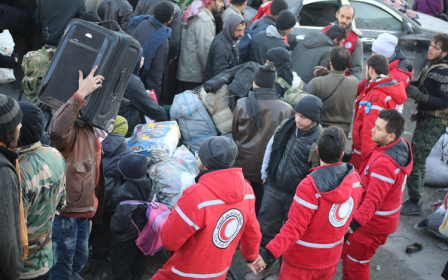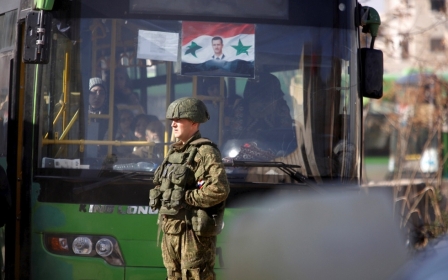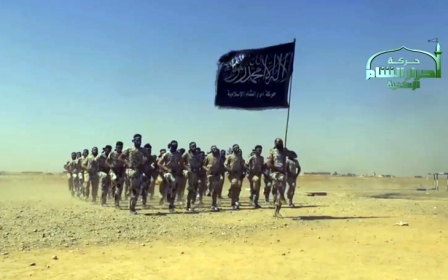Syrian army reclaims east Aleppo

Syrian troops strengthened their hold over Aleppo on Friday after retaking full control of the city, as residents anxious to return to their homes moved through its ruined streets.
The army announced on Thursday it had overrun the former rebel stronghold of east Aleppo following a landmark evacuation deal that saw thousands of opposition fighters and residents bussed out.
It was the biggest victory for President Bashar al-Assad's forces in nearly six years of civil war and a major win for his foreign backers, with key ally Russia hailing the "very important" step.
Braving the cold, war-weary residents crossed districts that had become dangerous front lines, eager to return to neighbourhoods they had not seen in years.
Civilians wrapped in coats trekked through the cold, some rolling their belongings on wheelbarrows.
"I came to check on my house, which I haven't seen in five years," resident Khaled al-Masri said. "I really hope my home wasn't badly damaged."
Opposition forces still control an area west of Aleppo, and at least six civilians were killed Friday in the first rebel rocket fire on the city since it fell under government control, the Syrian Observatory for Human Rights said.
Later Friday, air raids targeting rebel territory to the west of the city killed three fighters, the Britain-based monitor said.
Near the ancient city of Palmyra, the Islamic State group killed 27 Syrian soldiers and allied militiamen in a series of attacks, the Observatory said.
'Nothing left'
The evacuation agreement was brokered between Turkey and Russia, which has staunchly supported the Syrian government despite it being accused of human rights abuses.
Russian President Vladimir Putin called Assad on Friday to congratulate him on the "liberation" of Aleppo, the Kremlin said.
"This success was possible thanks to mutual efforts of all who came together in the fight with international terrorism in Syria," it said.
Earlier, Putin hailed Aleppo's recapture, calling it a "very important part of the normalisation in Syria," saying the next step would be "conclusion of a ceasefire agreement on all of Syria's territory".
The Kremlin also announced that Putin had signed an order to expand Russia's naval facility in the Syrian city of Tartus, while Russian military police had been dispatched to recaptured parts of Aleppo.
"We sent in a battalion of military police yesterday evening to maintain order in the liberated territories," Defence Minister Sergei Shoigu said.
On Friday morning, government fighters moved into Ansari, Al-Mashhad and other neighbourhoods they had not entered since mid-2012.
They searched for improvised explosive devices and mines, clearing buildings to prepare the way for civilians to return, the Observatory said.
As they finished sweeping through the main streets, soldiers moved into the smaller alleyways to check for bombs, an AFP correspondent in one district said.
In Bustan al-Qasr, a heavily damaged neighbourhood near Aleppo's famed Old City, bulldozers removed rubble from the streets.
As the army moved through Al-Mayssar district, Umm Abdo, 42, said she had found her former home but it had been destroyed.
"There's nothing left... but houses can be rebuilt," she said.
Syria's war transformed Aleppo from the country's industrial hub to a worldwide symbol of bloodshed and devastation.
The army on Thursday announced "the return of security to Aleppo after its release from terrorism and terrorists".
'Toughest battles'
The government's victory came after state television said the last convoy of four buses carrying rebels and civilians had left east Aleppo and arrived in the government-controlled Ramussa district south of the city.
The evacuation deal, overseen by the International Committee of the Red Cross and the Syrian Red Crescent, put an end to a month-long offensive waged on Aleppo's east by pro-government forces.
The assault was backed by pro-government militia, including powerful Lebanese Shia movement Hezbollah.
In a televised speech on Friday, Hezbollah head Hassan Nasrallah said the army's win in Aleppo put an end to any hopes Assad's government would collapse.
"After Aleppo, one can comfortably say that the goal of regime downfall has failed," Nasrallah said.
The evacuation operation ended more than four years of fierce fighting in Aleppo, which had been divided between government forces in the west and rebels in the east since 2012.
Aid workers earlier this week told Middle East Eye that the evacuations had created a "humanitarian disaster" in parts of Aleppo as NGOs struggled to help accommodate the influx of thousands being displaced from eastern Aleppo.
Omar Ali, who is an aid worker for British NGO Human Appeal, told MEE: "With so many people on the move in different directions without shelter, and so many people living in makeshift refugee camps inside Syria trying to flee to the border... the scale of funding given to humanitarian aid groups is simply not enough."
The ICRC said the evacuation operation had seen 35,000 people bussed out of Aleppo and another 1,200 evacuated from Fua and Kefraya, two Shia-majority towns in northwest Syria besieged by rebels.
Nearly six years in, the conflict has killed more than 310,000 people and displaced half of Syria's pre-war population.
The army's win in Aleppo has put the spotlight on the role of powerbrokers Russia, Iran and Turkey, which agreed this week to guarantee new peace talks and backed expanding a ceasefire.
Repeated attempts at peace have failed, but UN envoy Staffan de Mistura has said he hopes to convene fresh talks in Geneva in February.
New MEE newsletter: Jerusalem Dispatch
Sign up to get the latest insights and analysis on Israel-Palestine, alongside Turkey Unpacked and other MEE newsletters
Middle East Eye delivers independent and unrivalled coverage and analysis of the Middle East, North Africa and beyond. To learn more about republishing this content and the associated fees, please fill out this form. More about MEE can be found here.




